The Bureau of Public Procurement (BPP), established to ensure transparency and competitiveness in the awarding of government contracts, is facing serious allegations of misconduct as it reportedly approves 298 projects without adhering to the necessary due process. This situation arises amidst claims that various ministers and heads of government agencies are flouting the Public Procurement Act of 2007, raising concerns over corruption and mismanagement of public funds.
READ ALSO: ‘Stay with cheating husband, don’t divorce but protect yourself’ – Actress Toyin Agbeola
According to investigations conducted by The Authority, the BPP, which is tasked with the oversight of public procurement practices, appears to be either ill-equipped to enforce compliance with the law or complicit in the ongoing violations. Since the appointment of President Bola Tinubu in May 2023, the situation has reportedly deteriorated, with ministers increasingly pressuring the BPP to overlook critical sections of the Procurement Act in the name of expediency.
Historically, the establishment of the BPP was a response to rampant corruption in public procurement processes, a problem that was notably addressed by former President Olusegun Obasanjo. He created the Budget Monitoring and Price Intelligence Unit (BMPIU), also known as Due Process, and signed the Public Procurement Act into law in 2007, with the aim of promoting integrity in government contracts. However, the recent findings suggest that the very agency designed to uphold these standards is now enabling disregard for them.
READ ALSO: Central Bank of Nigeria Links FAAC Allocations to Exchange Rate Stability
The BPP has been criticized for granting approvals that allow ministers and heads of agencies to award contracts without following the mandated competitive bidding processes. Sources within the BPP have indicated that the agency’s leadership is under significant pressure from various ministries to expedite contract awards, citing the need for rapid infrastructural development as outlined in President Tinubu’s Renewed Hope Agenda.
A notable example of this trend can be seen in the Federal Ministry of Works, led by Senator David Umahi, which has emerged as a primary offender in this procurement debacle. The ministry has sought waivers from the BPP to bypass competitive bidding for hundreds of contracts, arguing that the usual requirements would impede the government’s ability to implement its development agenda swiftly. In a letter dated July 5, 2024, the ministry requested approval to award 428 contracts without competitive bidding, a request it reiterated later that month.
In its response, the BPP granted the ministry a “No Objection” certificate for the adoption of restricted tendering methods for various projects, including the construction and rehabilitation of roads and bridges. This decision has raised eyebrows among stakeholders who question the integrity of the procurement process and the potential for corruption in awarding contracts without adequate oversight.
The BPP’s acting Director-General, Barr. Olusegun Omotola, emphasized the need for the ministry to ensure compliance with the law by shortlisting at least three responsive firms for each contract and conducting due diligence checks on the recommended companies before awarding contracts. While this may appear to be a step towards maintaining some level of oversight, critics argue that the very act of granting waivers undermines the principles of transparency and accountability that the BPP was created to uphold.
The implications of these actions are significant, as they not only threaten the integrity of public procurement but also risk the loss of billions of Naira in taxpayer money due to potentially inflated or unnecessary contracts. The lack of adherence to the Procurement Act raises alarms about the potential for corruption and the misallocation of resources that could otherwise be directed toward essential public services.
READ ALSO: APC warns Yiaga Africa to stop questioning Edo poll results
Efforts to obtain comments from BPP spokesperson Ms. Janet McDickson regarding the agency’s decisions and the rationale behind granting “No Objection” certificates to ministries that have not adhered to procurement requirements have been unsuccessful. As the situation unfolds, it remains to be seen how the BPP will address these allegations and whether any measures will be taken to restore public trust in the procurement process.
The ongoing developments highlight a critical need for reform within Nigeria’s public procurement system to ensure that the principles of transparency, accountability, and competitiveness are upheld, ultimately safeguarding public funds and promoting effective governance.


